We may not have the course you’re looking for. If you enquire or give us a call on 01344203999 and speak to our training experts, we may still be able to help with your training requirements.
Training Outcomes Within Your Budget!
We ensure quality, budget-alignment, and timely delivery by our expert instructors.
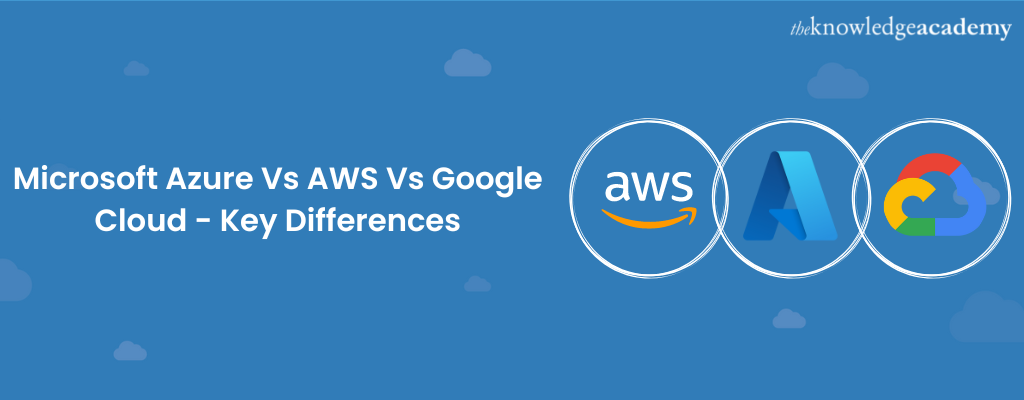
Cloud computing technology has advanced enough that it's considered a necessity rather than an option. In recent years a large majority of firms have started to opt for cloud-based services instead of locally hosted services. According to Statista, usage and adoption of public cloud services went up to 45% for Microsoft Azure, 19% for Google Cloud Platform (GCP) and 46% for Amazon Web Service (AWS).
Amidst the sudden growth spurt and rising popularity of many cloud-based service providers, Microsoft, Google and Amazon have emerged as technological and industrial giants. This raises the question, which of the three service providers is the better choice for you? Check out this detailed comparison of Microsoft Azure Vs Aws Vs GCP. Know more!
Table of Contents
1) Cloud computing overview
2) Origin of cloud giants
3) Cloud Services and Key Tools
4) AWS vs Azure vs Google cloud: Comparisons
5) Azure vs AWS vs Google Cloud Platform: Cost and Pricing
6) AWS vs Azure vs Google cloud: Pros and Cons
7) Conclusion
Cloud computing overview
Before we discuss the grand rivalry between the three cloud service giants, let's understand cloud services. It refers to all mechanisms and functions of computing, such as storage, databases, analysis and even Machine Learning (ML) and Artificial intelligence (AI), all done online.
The key defining factor of cloud-based services is it provides you with resources you lack locally. An example of this will be saving any form of data, such as images and documents, online via the cloud if you don't have local storage to save it. Cloud services make high-end resources like storage and processing much more accessible for everyday users and industries. Cloud services provide users with a rent system and take a "pay as you go" approach with their services.
The cloud-based services have helped individuals and organisations on several levels. For instance, these have resulted in reduced expenses, more efficient infrastructures with low maintenance costs, better access to several resources and easier scalability.
Origin of cloud giants
Amazon, Google and Azure have arguably monopolised the cloud-based service provider industry. This makes all three of them a valid option as a first choice if you seek cloud-based services either, for personal or business use. But to do that, it is necessary to understand their history and establishment.
Amazon Web Service
Amazon Web Services, also referred to as AWS, was made available for the first time in 2006, with compute services like Elastic Compute Cloud (EC2) and storage options like Amazon S3. Later in 2009, the company made more services publicly available, such as Elastic Block System (EBS), Content Delivery Network (CDN), and Amazon CloudFront. The company became the first to publicly offer cloud services, beating internet giants like Microsoft and Google.
Wish to start working with Amazon cloud infrastructure? Join our course in Amazon AWS Training!
Microsoft Azure
Microsoft Azure, initially referred to as simply "Azure”, became publicly available as a service in 2010. In 2014, Azure was renamed "Microsoft Azure" as a strategic response to Amazon's EC2 and Google's App Engine. Microsoft Azure (Initially referred to by the code name "Project Red Dog") was built as an extension of Windows NT, initiating Microsoft's cloud services.
Inexperienced with Azure’s cloud mechanics? Join Microsoft Azure Fundamentals AZ900! and start your journey in Azure.
Google Cloud Platform
Google Cloud Platform, or simply GCP, was launched in 2008. Google strengthened its already popular products like the search engine and YouTube thanks to its cloud platform, which shares the same infrastructure as them. Google later launched its cloud services at the enterprise level, allowing most users to access GCP.
Interested in learning more about Google Cloud? Take our course in Google Cloud Training and develop professional role skills for Google!
Cloud Services and Key Tools
Here are a few comparisons of services offered by the three cloud giants. It is necessary to consider their features and strengths before selecting one as a service provider. Such factors can have a huge effect on your cloud-based performance.
Compute services
Cloud computing offers raw resources such as processing power using a subscription system. These services are typically geared towards software, web development firms and other companies. AWS comes with Amazon EC2, which provides a general-level Virtual Machine (VM). Azure has a similar VM, available in both general-purpose compute and memory-optimised ones. GCP compute engine provides not only computer optimisation and general VMs, but also a high-performance CPU core.
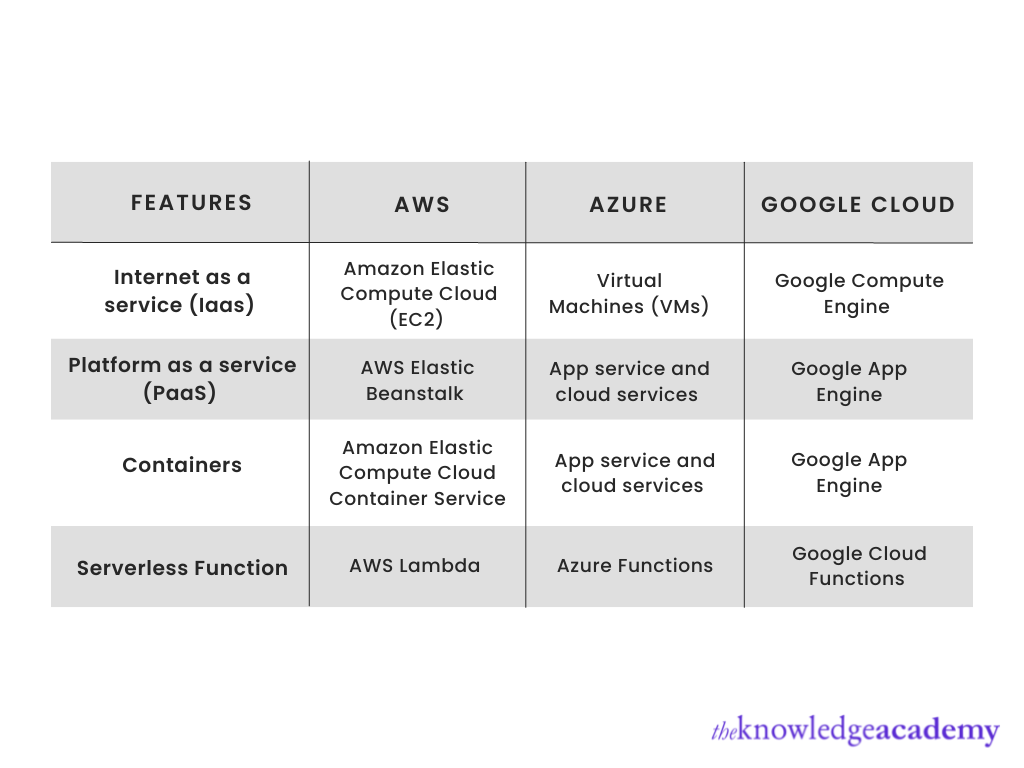
Database
All three cloud service providers have similar database features to a certain degree. For instance, each offers a Relational Database Management System (RDBMS), a cloud monitoring tool and an automatic backup option for data loss. All three of them make it easy to recover your lost data due to a "point in time data recovery" feature, which allows you to change the state and values of your data based on a certain instance of time. For example, if you lost your data today for some reason, but if it was available yesterday, you can revert it to yesterday's state, thus gaining back the data in the process.
However, doing so on Google can be highly troublesome out of all three could service providers. In addition, the fact that Google Cloud has the shortest data retention period out of the three makes it a less viable option.
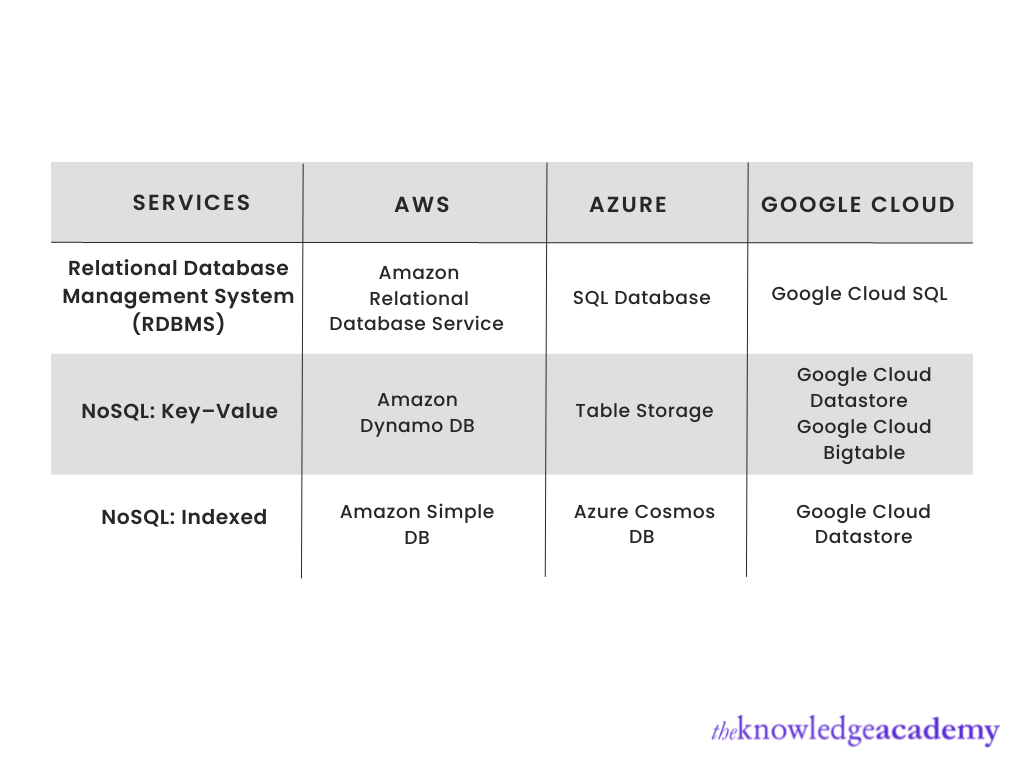
Storage
All of the cloud service providers give you the option to store your data. AWS can optimise storage for high sequential workloads requiring read and write access. AWS makes sure as soon as an instance starts, it is immediately demolished at the end case. Azure provides the virtual machine for storage optimisation and burstable instances, which lets the CPU increase its performance to deal with occasional high usage. Google Cloud also possesses a burstable virtual machine (also referred to as shared core), followed by brief stockpiling; however, GCP does not possess a storage optimisation.
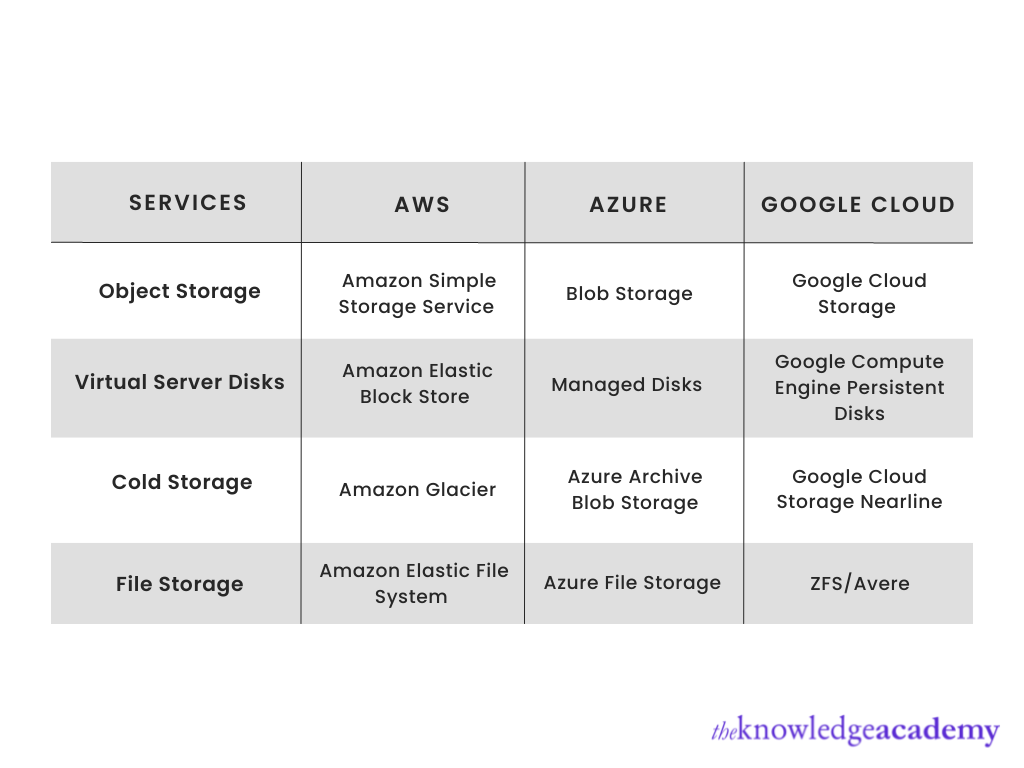
Networking
Cloud services offer the benefits like service management. Still, it also comes with its own challenges, such as connectivity issues while using native cloud services and on-premise networking. Its core issue is determining how secure the established connection is.
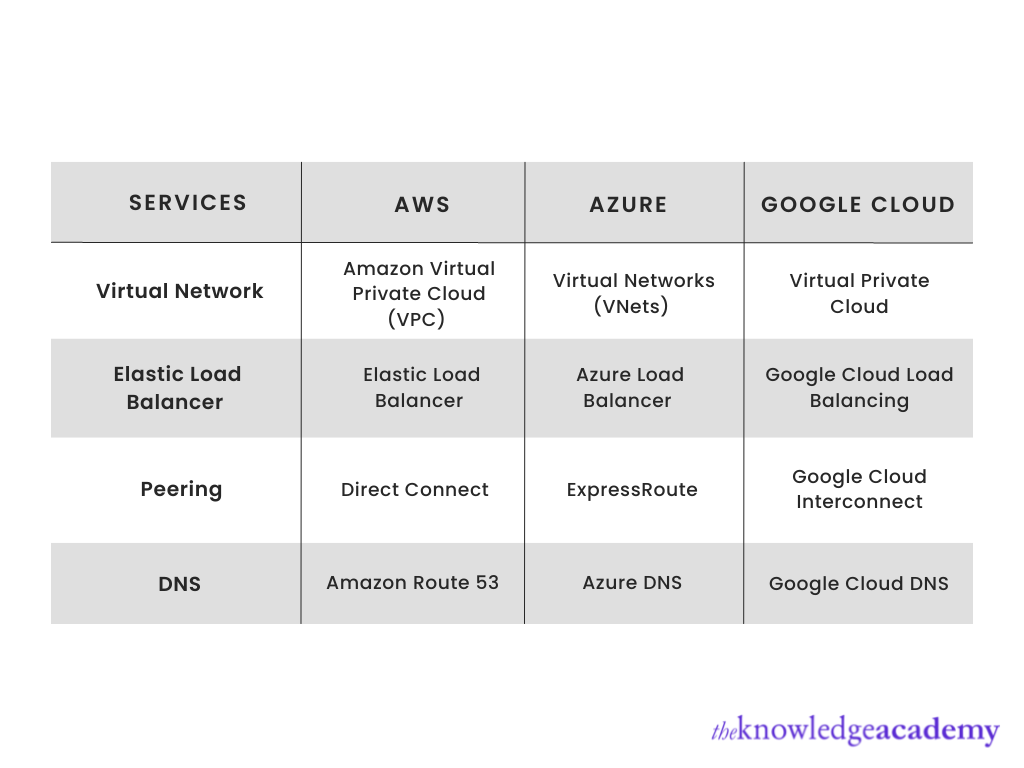
Key tools of Cloud services
All three cloud service providers constantly aim to provide more than the other two, in addition to the integrated benefits of their other products. Such rivalry makes them offer a cloud-based tool that helps a cloud-based professional in their work, bringing them ease of work. Here are some details about the tools commonly provided and utilised by the respective cloud service provider.
Amazon web service:
AWS has many diversified AI-based services. One of them is DeepLens which is used to develop and deploy machine learning algorithms through an AI-powered camera. AWS also has a deep-learning library known as Gluon. It can be utilised to build a neural network, even if you are not well-versed in AI, and it is open-sourced.
AWS enables many machine-learning and AI-based services, such as the lex conversation interface for Alexa, AWS Greengrass, Lambda and AWS Sage Maker.
Azure
Microsoft invested heavily in AI by offering services like "Azure ML" with a visual-based interface, Face Application Programming Interface (API), Text Analytics, and Bing Web Search API. Azure also has the added benefit of supporting on-premise (on-prem) Microsoft software; for example, Azure backup links to windows server backup.
Google has speech translation options (Google Translate) and API for Natural Language (NL). The company has become the leading AI developer among the three. Google's advancement in AI comes from Tensor Flow, a very popular open-source library.
AWS vs Azure vs Google cloud: Comparisons
Each of the respective cloud services has its differences, and they group their services according to their target customers. Some such differences may be more than just the scope of their services and actual performance but also their regional limits and availability. Customers for each service are often tailored while keeping this in mind, and vice versa, is also true.
Customers
Here is a list of notable users and corporates for respective cloud services providers.
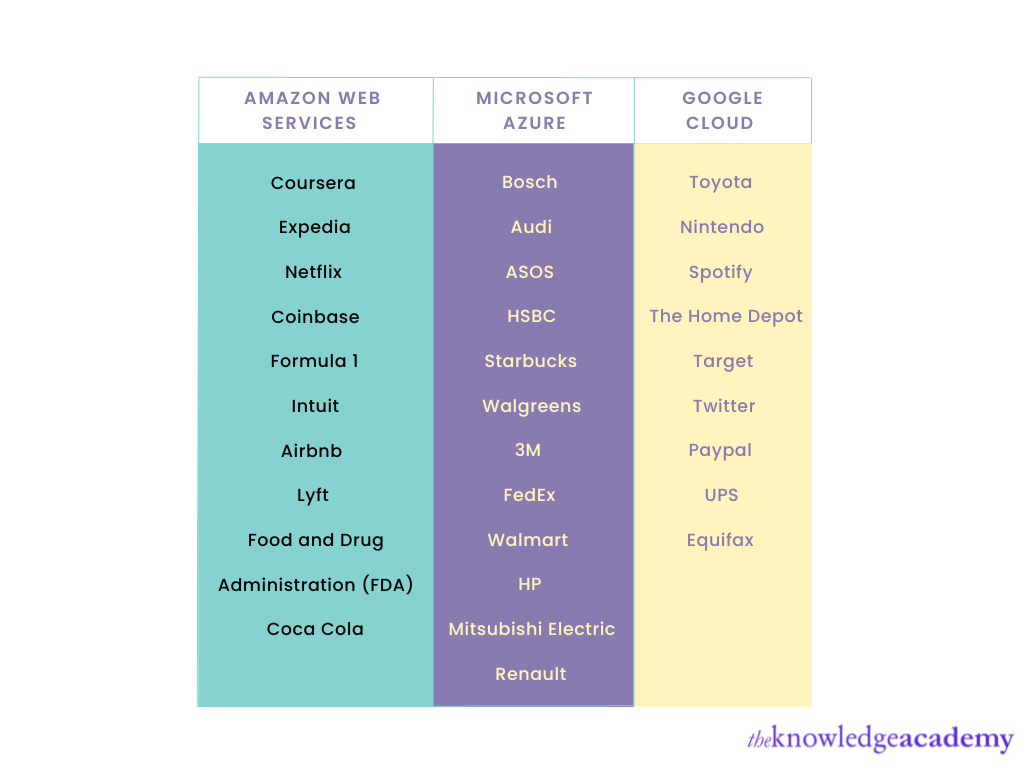
Regions and availability of service
Regions directly impact your services due to issues like compliance and latency. Even before that prime concern should be if the respective service is available in your location. This is especially true while working with data to avoid issues like data loss. The recent region and availability of the three services are as follows:
Amazon Web Services:
It is currently divided into 31 geographic regions with 14 data centres. It has 99 availability zone. AWS currently also possesses more than 410 points of presence, more than 400 edge locations and 13 regional edge caches.
Microsoft Azure:
Currently, it has more than 60 announced regions in 140 countries, with three availability zones per region.
Google Cloud Platform:
As of 2022, GCP was available in 34 different regions over 103 zones. Currently, GCP has over 100 locations.
Hybridisation
Currently, there are four types of cloud deployment modes. They are - Public, Private, Community and Hybrid models. The public cloud was designed to host websites, while the private cloud was made with the intent to handle sensitive data. Community cloud allows systems and services to be accessed by a group of organisations. Later, the hybrid model was developed to combine both features of private and public cloud models.
The hybrid cloud was designed for hosting a website and handling sensitive data simultaneously. It is used when you need to deploy across multiple different vendors but also needs to maintain some application premise. Although the three vendors do not significantly offer hybrid and multi-cloud features, here are some tools that offer you flexibility with Multi-Cloud and Hybrid cloud.
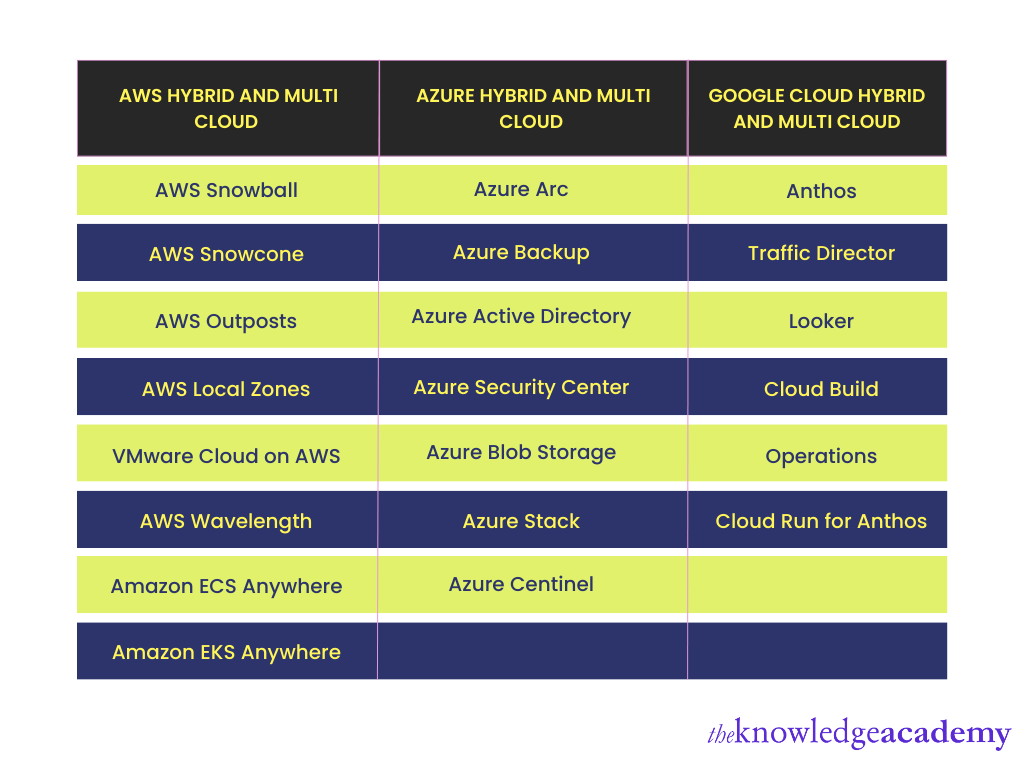
Integration of Service
All of the services have their technologies and products beyond the cloud. Here we will focus on how many products and tools are integrated into the cloud service provided by the three internet giants. This leads to added benefits of additional services that you receive alongside the cloud services. Some of the technologies may be their systems, applications as well as a real-time exchange of data.
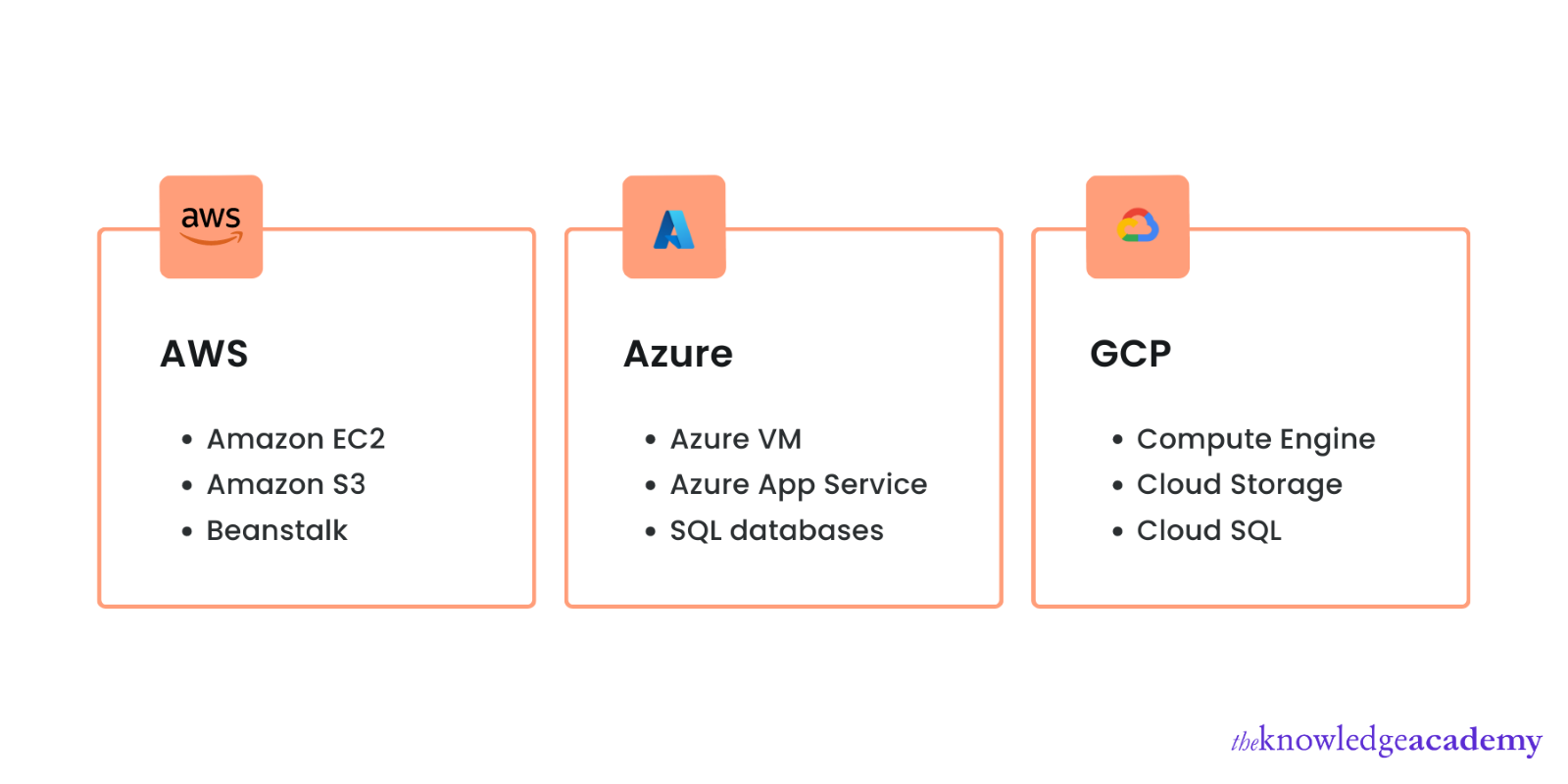
Job prospects
With the respective technologies of the three companies, the need for people who could manage, run, and maintain the technologies was felt. This opened doors for many high-paying job options within the three companies. Here are a few roles according to the respective services and their needs.
a) Amazon web service: £62,347 per year.
b) Microsoft Azure: 61,711 per year.
c) Google Cloud Platform: 30,000 to £ 1,05,975 per year.
Certifications in Cloud Services
Due to rising demand in the job roles within the cloud service-providing giants, it was only a matter of time before they launched certifications for expertise in their respective technologies. As a result, the companies launched their qualification exams to certify one's expertise in the relevant skills. Some examples of such certifications and exams are as follows.
a) AWS Solution Architect Certification
AWS has Solutions Architect – Associate (SAA-C03) exam for AWS-certified solutions architects. The exam validates and certifies the knowledge and skills of current best AWS-based practices. An AWS Architect's general goal is to deliver secure solutions that denote innovation, high performance and reliability while keeping them cost-optimised.
b) Microsoft Azure Solution Architect (AZ-305)
It is a certification that assesses the capability of an individual in designing hybrid cloud systems utilising Microsoft Azure. People qualifying for this certification are capable of computing, storage, monitoring and implementing security as Azure Solution Architects. Such individual is expected to be well-versed and skilled in disaster-based recovery, data platforming identity management and governance.
Microsoft has divided its certifications into three levels, fundamental, associate and expert, with a certification in each specialised job role. Fundamental certifications have no prerequisites or requirement, while associate and expert certifications demand clearance and understanding of previous and lower-level certifications, respectively.
c) Google Professional Cloud Architect Certification
A Google Professional Cloud Architect certification denotes knowledge and understanding of the cloud platform and AWS Architecture. A Google Cloud Architect is supposed to be able to design, develop, and manage solutions. They aim to make the solution scalable, secure, robust and dynamic while keeping the availability high.
Gain knowledge on designing solutions with our course in Designing Microsoft Azure Infrastructure Solutions AZ305! And become an Azure Architect!
Azure vs AWS vs Google Cloud Platform: Cost and Pricing
Due to the constant rivalry of Azure vs AWS vs Google cloud, their pricing and subscription plans are equally competitive. All three cloud service providers give you additional cost management options, such as resource optimisation and budget plans.
AWS and Azure have a pay-per-minute billing system, compared to Google Cloud, which uses a "pay-per-second" usage billing system. Pay-per-second models allow you to save much more than Aws and Azure, which, combined with discount offers from Google, make it a more financially viable choice out of the three.
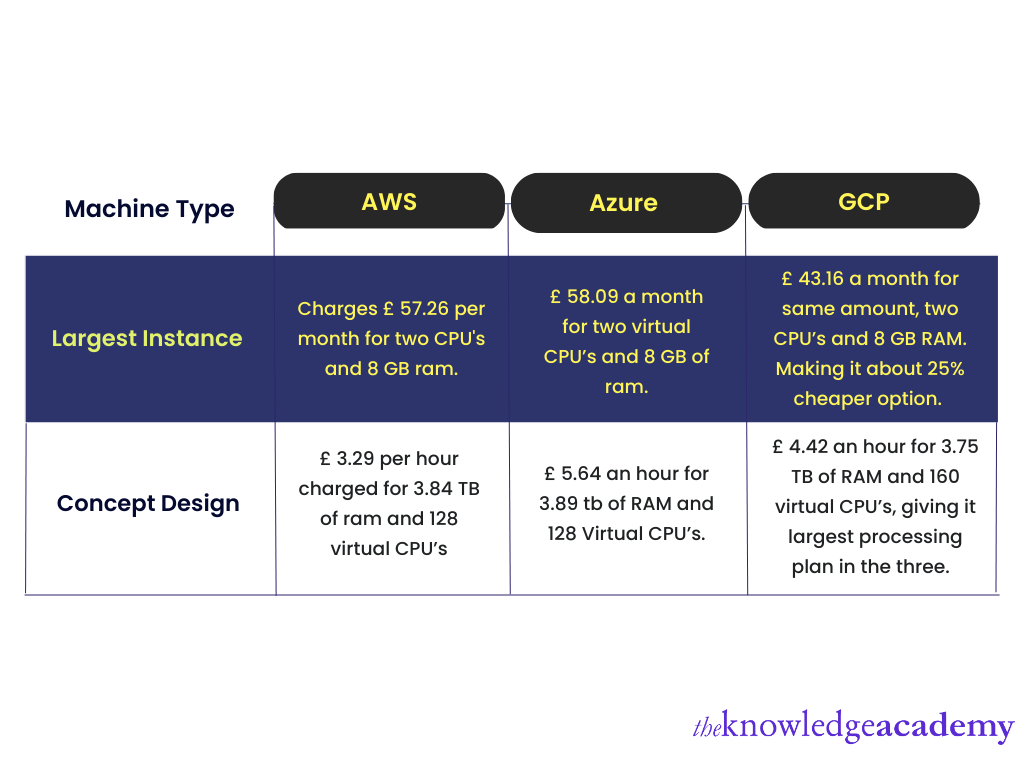
AWS vs Azure vs Google cloud: Pros and Cons
Similar to how each cloud service provider has unique strengths, they also have respective shortcomings. Let's check out their pros and cons to see if their strengths outweigh their flaws or vice versa.
Amazon Pros vs Cons
Being the oldest and hence the most mature of the three, it is considered the most secure. It is considered the standard when it comes to cloud-based services. Almost the majority of software development firms make their programs readily available on AWS due to how reliable it is. AWS is known for its high transfer stability, where minimal data loss occurs during storage and server transfer.
Additionally, the developer and enterprise support purchase are protected behind a paywall. AWS' hybrid cloud options are minimal. Additionally, despite having many services to offer to customers, the wide variety can be intimidating to most newcomers.
Microsoft Azure Pros vs Cons
One of the most significant advantages of Azure is the easy integration with other existing Microsoft services. Many of these services offer extremely powerful Artificial Intelligence, Machine Learning and analytical operations. Microsoft Azure also has a fantastic amount of support for Hybrid cloud-based operations and models while being relatively cheaper of the three.
On the other hand, Azure aims towards enterprise-based organisational customers rather than personal use and operations. Azure can be demanding, as it needs high expertise in the usage of its products. Additionally, it is often lacking in the maintenance needed for the platform.
Google Cloud Pros vs Cons
Google has an excellent reputation with the open-source community, as it is known for very closely managing open-source services managing, a trait not found in the other two cloud services. Google also offers good integration with its other services, like its app engine, and excellent support for effectively managing the workload. Google was even responsible for having developed the Kubernetes standard, which AWS and Azure offer now.
While Google integrates most of its services for its cloud-based service, AWS and Azure provide far more excellent support for enterprises. Google's lack of maintaining a relationship with its organisational customer has to be its biggest drawback.
Conclusion
After reading this Microsoft Azure vs AWS vs Google Cloud Platforms blog, we hope that you have understood the differences between them. Today, these are the most popular and widely used cloud-based service providers. Every individual user and corporates have varying demands from a cloud service provider depending on the region as well as the scope of business. Your choice of which cloud service is the best for you depends on your personal needs and your experience with cloud services.
Frequently Asked Questions
Upcoming Microsoft Technical Resources Batches & Dates
Date
 AWS RoboMaker Training
AWS RoboMaker Training
Fri 26th Jul 2024
Fri 25th Oct 2024







 Top Rated Course
Top Rated Course





 If you wish to make any changes to your course, please
If you wish to make any changes to your course, please


